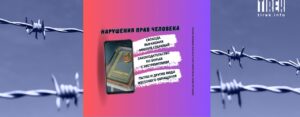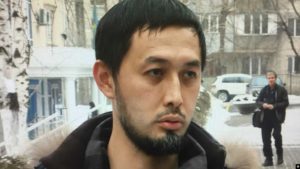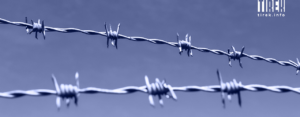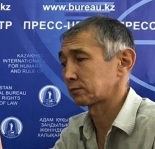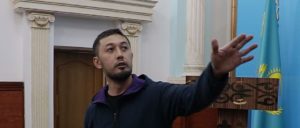KAZ 001 / 0120 / OBS 050
Attacks /
Harassment / Smear campaign
Kazakhstan
May 11, 2020
The Observatory for the Protection of Human Rights Defenders, a partnership of FIDH and the World Organisation Against Torture (OMCT), requests your urgent intervention in the following situation in Kazakhstan.
Description of the situation:
The Observatory has been informed by reliable sources about a smear campaign against Mr. Yevgeniy Zhovtis and other representatives of the non-governmental human rights organisation “Kazakhstan International Bureau for Human Rights and Rule of Law” (KIBHR) [1]. The acts of harassment in social networks and online news media come after the critical position taken by the KIBHR in relation to the draft law “On the Procedure for Organizing and Holding Peaceful Assemblies in the Republic of Kazakhstan” (“draft law”), that was adopted by Majilis (the lower Chamber of the Parliament) on April 8, 2020, while the state of emergency is declared in the country [2].
According to the information received, on April 28, 2020, a large-scale, well-orchestrated smear campaign was launched in the media and social networks against Mr. Yevgeniy Zhovtis, the KIBHR, and other civil society organisations critical of the draft law. The online operation followed several publications by the KIBHR, including a statement [3] against the adoption of the draft law, which it found to be contrary to international human rights standards on the freedom of assembly, and a translation of the Recommendations of the United Nations Special Rapporteur on the rights to freedom of peaceful assembly and of association Mr. Clément Nyaletsossi Voule, who has previously addressed his concerns on the issue to the Kazakhstan government. [4]
Several dozens of publications appeared on social networks and online media, that systematically receive funds from the State, in a short period of time from April 28 to May 2, 2020. Many of the posts similar in letter and identical in spirit appeared almost simultaneously within the span of one or two days. Besides ordinary internet users and fake accounts, among the authors of publications are public figures known for extreme nationalist views and owners of a government-linked “troll factory”. [5] These posts were primarily accusing the KIBHR of defending the right of foreigners to peaceful assembly. Many of the attacks were also focused on the ethnicity of the KIBHR employees and on the fact that the organisation receives funding from foreign donors.
The Observatory is concerned by these facts of harassment as they appear to be part of an organised smear campaign set up in order to stifle the criticism against the controversial draft law. Against the backdrop of the COVID-19 pandemic, the online attacks are particularly alarming since the only space available for public discussion of the draft law is online: public forums, civil society protests against legislative initiatives and other forms of discontent are not possible due to the restrictions on the right to freedom of assembly imposed during the state of emergency in Kazakhstan.
Furthermore, the Kazakhstan authorities seem to use a state of emergency as an excuse to prosecute its critics and opponents. Since the announcement of the state of emergency in Kazakhstan on March 15, 2020, the authorities have initiated administrative proceedings and threatened with criminal prosecution dozens of civil society activists, bloggers and all those who expressed their dissent online.
On April 18, 2020, Mr. Alnur Ilyashev, a civil society activist, was detained and subsequently placed in a pre-trial detention centre for publishing a video on YouTube. He was charged under Article 274.4(2) of the Criminal Code of the Republic of Kazakhstan (“Dissemination of knowingly false information,” aggravated as dissemination “in a state of emergency or in a state of combat, or in wartime, or in the course of a public event”). On May 4, 2020, another activist, Ms. Danaya Kaliyeva, was summoned for a first interrogation as a witness because of a repost of a publication concerning the construction of hospitals for patients with COVID-19, which she made on her Facebook page. According to reliable sources6, the authorities opened a preliminary investigation into her case under the same Article 274.4(2) of the Criminal Code. Earlier, in late March, a social networks user Mr. Dias Moldalimov, was charged under Article 274.4(2) of the Criminal Code after he addressed in a video publication a series of questions to the authorities. On April 12, 2020, Mr. Arman Khasenov was arrested in Karaganda for his critical remarks about the family of ex-President Nazarbayev, in a video published in the Internet, and was allegedly charged under Article 373 of the Criminal Code (“insulting the first president of Kazakhstan”).
The Observatory is particularly concerned with the inaction of the authorities regarding the harassment faced by the KIBHR members. In accordance with Article 19 of the International Covenant on Civil and Political Rights (ICCPR), ratified by Kazakhstan in 2006, the State has a legal obligation to protect freedom of expression and the right to hold opinions from unlawful interference, even by third parties. This positive State obligation encompasses freedom of expression on the Internet. The use of State financial or administrative resources to publish a large number of harrassing messages on the Internet targeting KIBHR was apparently intended to stifle the critical voices and, therefore, has the effect of inappropriately chilling free speech via the Internet by the KIBHR.




